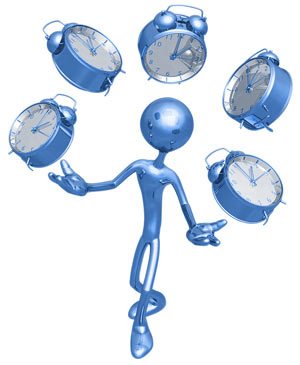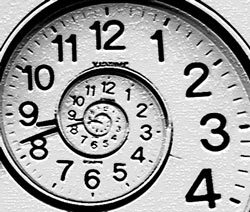
Time Management- Donner du temps au temp
Time in the organization is constant and irreversible. Nothing can be substituted for time. Worse, once wasted, it can never be regained. Everyone has numerous demands on their limited time. Time keeps getting away and we have trouble controlling it. No matter what your position, we cannot stop time, we cannot slow it down, nor can we speed it up. Thus, time needs to be effectively managed to be effective.
 On the other hand, you can become such a time fanatic convert by building time management spreadsheets, creating priority folders and lists, color coding tasks, and separating paperwork into priority piles that you start to waste more time by managing it too deeply.
On the other hand, you can become such a time fanatic convert by building time management spreadsheets, creating priority folders and lists, color coding tasks, and separating paperwork into priority piles that you start to waste more time by managing it too deeply.
The late French President François Mitterrand used to say. “Give time for time – Donner du temps au temps” The notion being that you need to make time in order to appreciate the ultimate gift we have been given: time on this earth. Every day, we make conscious and less conscious choices on time allocation. Some uses of our time are routine — dropping off kids, eating meals, or going for a daily run. In between those routines, we look to our agendas to see what we are meant to be doing, whom to meet, when and where to go next.
Most of us will spend more than one-third of our lives and more than half of our waking adult hours in our job. A friend started his business and installed a No-Hour Workweek (NHW).

The NHW means they work on projects at night and over the weekends, and are constantly attending industry and networking events.
The No-Hour Workweek also means that team members can come in at 8, 12, or not at all if they’d prefer to work remotely. It means they can work at the times they’re most productive, make family gatherings, attend to personal commitments, leave early for travel or yoga or drinks with friends.
“Guard your own spare moments.
They are like uncut diamonds.”
— Ralph Waldo Emerson
Unfortunately not all businesses can adopt an No-Hour Workweek. My friends Team had some rules; worth considering, their four tenants were Respect, Focus, Environment and Leisure Time.
His Team framed these ideas in this fashion:
· Respect: Means you do not place unrealistic demands on each other. If something is urgent, we treat it as such, but we don’t expect an immediate response on every item. We’ve hired people that respect each other and work as a team. They

Whenever a goose falls out of formation, it suddenly feels the drag and resistance of trying to go it alone and quickly gets back into formation to take advantage of the lifting power of the bird immediately in front. • If we have as much sense as a goose, we will stay in formation with our team.
· Focus: Means there is always more to do. Each individual needs to understand his or her immediate priorities and what we expect of them. With a little guidance, they come up with specific, measurable goals to be reviewed every three months (and more frequently when necessary). It provides autonomy in the role and helps us work towards a common goal.
· Environment: Means create a positive and cohesive work environment for our team. Despite all their options, our full team is in the office 95% of the time because they enjoy working here. My friend’s team has regular team lunches.
· Leisure time: The expectation to switch on whenever needed means encouraging employees to switch off just as frequently. We are a team of entrepreneurs, and we all know the best ideas are inspired away from the desk.
Respect, focus, environment and leisure key points to keep in mind; respect does not mean we can’t challenge each other. Focus means we have the right to expect, to demand the very best from one and other. Our environment must be organized, unified and interconnected-cohesive. Our positive atmosphere requires we all be “Activists, Advocates –militant about our processes and protecting our reputation. We need more information, more customer approvals before we turn on the tap.
Time is finite; energy is not. Rest and recuperation are the best way to boost energy levels. More energy means more creativity. More creativity means better work. And that’s a good outcome for everyone, and the world.


Leave a Reply